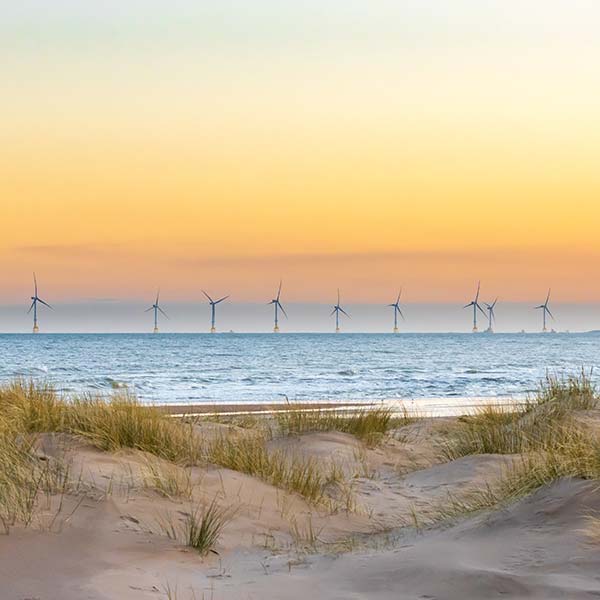MSc Electrical Power & Energy Systems
ApplyKey facts
- Start date: September
- Accreditation: Institution of Engineering & Technology
- Study mode and duration: 12 months full-time
Industry Engagement: Competitive internships available
Study with us
This MSc is designed to equip you with the industry-ready expertise needed for a successful career in the global energy sector. You'll:
- develop advanced skills in the design, planning an operation of modern electricity and renewable energy systems
- gain a deep understanding of renewable energy technologies and their role in a liberalised power markets and globalised energy systems
- learn how technological innovation is transforming power systems – from smart grids to energy storage – and shaping the future of energy infrastructure
- benefit from real-world insights through guest lectures, seminars and project opportunities with industry professional tackling today’s energy challenges.
Why this course?
The electricity supply industry is undergoing a profound transformation to integrate distributed energy sources and adapt to evolving patterns or electricity consumption. This transition is creating exciting new opportunities, and a growing demand, for a highly-skilled workforce capable of leading and driving these changes. The MSc Electrical Power & Energy Systems is designed to respond to this demand, equipping you with the expertise to contribute to the dynamic and fast-changing energy sector.
Delivered by the Department of Electronic & Electrical Engineering, the course brings together advanced expertise in all aspects of electrical energy and power systems, complemented with studies in electricity markets and power system economics.
You'll explore the underpinning technologies of the power sector, alongside the user and application requirements that define modern energy systems.
A key focus is placed on understanding the business and regulatory landscape in which national and multinational power and utility companies operate. Through direct engagement with industry experts, you will gain valuable insights into business operations, real-world engineering challenges, and technology-driven solutions shaping the future of energy.
"Our department hosts one of the largest and most advanced research groups in power engineering in Europe. This MSc leverages this cutting-edge expertise, offering a diverse range of modules designed to equip our students with the expertise needed to play a pivotal role in shaping the energy transition and building a sustainable future."
Professor Pawel Niewczas
Course Director


What you'll study
You’ll study a selection of taught compulsory and optional modules focused on the technologies, applications and operations associated with power and energy systems. These modules are designed to develop advanced technical expertise in these topics, complemented with the leadership and project management skills needed to help lead the industry in the process of transformation to a sustainable energy future.
Teaching semesters:
- Autumn semester - September to December
- Spring semester - January to May
MSc Project
Students who pass all compulsory and optional modules will progress the MSc Project, undertaken between May and August. This component involves an in-depth investigation into a core area within the electrical power and energy domains.
Projects may be:
- research-based, aligned with current departmental research themes, or
- industry-based, conducted as an internship with one of the department’s partner companies
While all projects are designed to address real-world engineering challenges, the competitive internships offer additional benefits, including:
- site visits
- access to relevant technical data & facilities
- mentorship from an industry professional
This course structure ensures that you graduate with not only academic knowledge but also practice experience and industry insight.
Check key dates for your MSc and the University academic session.
Advanced Power & Energy Systems (20 credits)
This class will allow you to understand, critically analyse and assess technical requirements for power system operation, management and planning. It will enable you to carry out advanced types of power system analysis as well as understand and use results from these analyses in power system operation and planning. You'll also develop an advanced knowledge of the main concepts related to the function, design and operation of protection schemes for distribution, transmission and generation applications.
Power System Economics, Markets & Asset Management (20 credits)
This class will present and give an understanding of the economics, trading and pricing of electricity supply and how it is shaped by technical, commercial and regulatory considerations.
It will give you an understanding of power system economics under an environment of multiple suppliers and users, and present the challenges, technologies and value of asset management within an electricity supply industry context. You'll gain a deep appreciation of factors affecting security of supply and how it might be quantified.
Assignment & Professional Studies (20 credits)
The aim of this class is to provide you with support for your general academic and professional development.
You'll undertake an advanced investigation of an electronic or electrical engineering topic of your choice, to enhance your learning, and develop presentation and communication skills.
You’ll study no more than 60 credits of optional modules. Please note that the below is an indicative list of modules, reflecting the curriculum in the current year. These modules are subject to change, but are likely to include:
Power Electronics for Energy & Drive Control (20 credits)
Modern energy conversion systems rely on the integration of range of technologies including power electronics, electromechanical actuators and energy storage elements. This class will build knowledge of the building block technologies and show their application to modern energy conversion systems.
High Voltage Technology & Electromagnetic Compatibility (20 credits)
This class will introduce you to the fundamentals of high voltage electrical insulating systems and the principles, mechanisms and characteristics of high voltage discharges in vacuum and condensed media. It will also provide you with a basic understanding of the behaviour of dielectric materials stressed with electric fields and their use in high voltage systems. You'll also gain an understanding of the principles of high voltage generation and impulse testing of the high voltage systems.
Wind Energy & Distributed Energy Resources (20 credits)
This class will provide an understanding of the principles of wind turbine power generation with attention to the wind resource, rotor aerodynamics, structural design, power conversion and control.
It will also examine the socio-economic issues relating to wind power and provide an underpinning in distributed energy resources including small scale generation, energy storage and demand management and their integration and management within power networks.
Sensor Technologies (20 credits)
A range of different sensors covering electrical, electromagnetic, environmental and mechanical measurements will need to be deployed to achieve efficient management of a power system as we transition to a de-centralised system. This module will provide the student with a broad appreciation of modern sensor technologies and their implementation in industrially relevant applications. It will cover the fundamentals of metrology and traceability, sensor characteristics and limitations, review of commonly used sensors and physical operating principles, and sensor signal conditioning. Examples of ultrasonic and photonic sensors for non-destructive evaluation of components and asset management applications will also be covered.
Power Electronics Devices, Drives & Machines (10 credits)
Data Analytics & AI for Energy Systems (10 credits)
A strong part of the business case for smart grids is using intelligence and automation to gain more capacity from existing assets to avoid large expenditure on further assets. Also, autonomy and intelligence is key to the flexible operation of smart girds, integration of low carbon generation and effective interaction with consumers.
This module teaches the key AI and data science methods that are applicable to smart grids, and provides case studies of their application. We are moving to a future where much more can and will be monitored and new techniques, leveraging data analytics, are needed to fully exploit the data. Areas covered will be machine learning, knowledge based methods, distributed intelligence methods and architectures, applications in asset management, applications in network management and control.
Students who successfully pass all required taught modules in Year 1 will progress to the MSc Project.
MSc Project (60 credits)
The aim of the research project is to provide you with an opportunity to bring your knowledge and skills together and deploy them in a significant practical investigation, using relevant engineering literature, and where relevant, initial experiments or simulations.
Learning & teaching
The MSc is delivered through a blended learning approach, combining both in-person and online methods to provide a flexible and engaging educational experience. Teaching methods include:
- lectures (in-person & online)
- problem-solving tutorials
- hands-on, project-based laboratory sessions
This approach is designed to equip you with advanced technical expertise, while also developing essential leadership, project management, and professional engineering skills.
Each module typically includes:
- five hours of direct contact time per week
- at least five additional hours of independent study, supported by the University’s virtual learning environment, digital research resources, & library facilities
This structure encourages you to take an active role in your learning and to deepen your understanding through self-directed exploration and research.
Assessment
Each module employs a variety of assessment methods designed to maximise your learning and help you realise your full potential. These methods may include:
- coursework – involving research, design & analysis tasks
- examinations – testing core theoretical knowledge & problem-solving
- lab reports – documenting technical investigations
- presentations – developing the ability to communicate complex ideas clearly & professionally
- group projects – fostering collaboration & innovation skills
- final MSc Project – a substantive piece of independent work demonstrating mastery of a specialist area
Weighting of assessments
Taught modules account for two-thirds (120 credits) of the total assessment, while the MSc Project contributes the remaining one-third (60 credits).
The project is assessed based on the technical quality and contribution of an interim and final report, a poster presentation and demonstrated initiative, independent thinking and project management skills.
This diverse assessment structure ensures that you are not only tested on your academic knowledge, but also on your ability to apply it in real-world and professional contexts.
Professional development & employability
We are committed to helping you build a strong professional network and enhance your employability. In today’s competitive job market, having the right skills, training, and mindset is essential for career success.
To support your development, the MSc offers:
- access to cutting-edge facilities & state-of-the-art laboratories
- guidance from academic experts who are leaders in their fields
- opportunities for industry engagement through internships, guest seminars, careers events & networking sessions
These experiences are designed to help you develop not only technical expertise, but also the professional confidence and connections needed to thrive in the global energy sector.
Facilities
The Department offers extensive teaching spaces alongside a dedicated Masters Project and Study Environment designed to support both self-study and group working. You’ll benefit from access to these facilities, as well as internationally leading research centres and state-of-the-art laboratories dedicated to topics covered within the MSc. These include high-voltage (HV) laboratories equipped with cutting-edge partial discharge systems, gas, liquid, and solid dielectric insulation measurement equipment, and associated HV instrumentation; and our distribution network and protection laboratory, featuring a 100 kVA microgrid, induction machines, and programmable load banks.
You’ll also have access to the Power Network Demonstration Centre (PNDC) - Europe’s first centre dedicated to the development, demonstration, and deployment of new smart-grid technologies and whole energy systems.
These facilities will support your project work, enabling you to explore exciting areas such as smart grid innovation and whole energy systems, high-voltage insulation diagnostics and asset health monitoring, renewable energy testing and grid integration.


The industry visits provided invaluable insights into the future of power networks, especially in optimising power generation and transmission for improved efficiency. This supported my understanding and learning of these topics.
Entry requirements
| Academic requirements | Normally a first-class or second-class honours degree (or international equivalent) in electronic, electrical, power or energy engineering, or a related subject. |
|---|---|
| English language requirements | If English is not your first language, please visit our English language requirements page for full details of the requirements in place before making your application. |
Pre-Masters preparation course
The Pre-Masters Programme is a preparation course held at the University of Strathclyde International Study Centre, for international students (non-UK/Ireland) who do not meet the academic entry requirements for a Masters degree at University of Strathclyde.
Upon successful completion, you'll be able to progress to this degree course at the University of Strathclyde.
Glasgow is Scotland's biggest & most cosmopolitan city
Our campus is based right in the very heart of Glasgow. We're in the city centre, next to the Merchant City, both of which are great locations for sightseeing, shopping and socialising alongside your studies.
Fees & funding
All fees quoted are for full-time courses and per academic year unless stated otherwise.
Fees may be subject to updates to maintain accuracy. Tuition fees will be notified in your offer letter.
All fees are in £ sterling, unless otherwise stated, and may be subject to revision.
Annual revision of fees
Students on programmes of study of more than one year (or studying standalone modules) should be aware that the majority of fees will increase annually. The University will take a range of factors into account, including, but not limited to, UK inflation, changes in delivery costs and changes in Scottish and/or UK Government funding. Changes in fees will be published on the University website in October each year for the following year of study and any annual increase will be capped at a maximum of 10% per year.
| Scotland | £11,900 |
|---|---|
| England, Wales & Northern Ireland | £11,900 |
| Republic of Ireland |
If you are an Irish citizen and have been ordinary resident in the Republic of Ireland for the three years prior to the relevant date, and will be coming to Scotland for Educational purposes only, you will meet the criteria of England, Wales & Northern Ireland fee status. For more information and advice on tuition fee status, you can visit the UKCISA - International student advice and guidance - Scotland: fee status webpage. Find out more about the University of Strathclyde's fee assessments process. |
| International | £31,100 |
| Additional costs | Course materials & costsAll students should expect to pay around £100 for additional course materials and other associated costs. You are not required to buy any specific software licences as all software used in classes will be available locally or remotely on campus machines. Some hardware (microcontrollers, design boards) may be available for loan purposes subject to a refundable deposit. If you choose to purchase these for project work, they cost approximately £10 to £30. Access to department computer labs out of normal working hours is via key card. This costs £20, but is refundable upon return of the card. You are provided with a printing quota for department lecture and tutorial notes, available for use in work conducted in department computer labs. You can buy top-ups if required through University IT Services. Some printing and report binding will be required as part of your course. This is provided by the department’s dedicated Resource Centre. Costs are likely to be about £10 to £20 per year, but will depend on the exact programme and classes taken. International studentsInternational students may have associated visa and immigration costs. Please see student visa guidance for more information. |
Please note: the fees shown are annual and may be subject to an increase each year. Find out more about fees.
How can I fund my course?
Scottish postgraduate students
Scottish postgraduate students may be able to apply for support from the Student Awards Agency Scotland (SAAS). The support is in the form of a tuition fee loan and for eligible students, a living cost loan. Find out more about the support and how to apply.
Don’t forget to check our scholarship search for more help with fees and funding.
Students coming from England
Students ordinarily resident in England may be to apply for postgraduate support from Student Finance England. The support is a loan of up to £10,280 which can be used for both tuition fees and living costs. Find out more about the support and how to apply.
Don’t forget to check our scholarship search for more help with fees and funding.
Students coming from Wales
Students ordinarily resident in Wales may be to apply for postgraduate support from Student Finance Wales. The support is a loan of up to £10,280 which can be used for both tuition fees and living costs. Find out more about the support and how to apply.
Don’t forget to check our scholarship search for more help with fees and funding.
Students coming from Northern Ireland
Postgraduate students who are ordinarily resident in Northern Ireland may be able to apply for support from Student Finance Northern Ireland. The support is a tuition fee loan of up to £5,500. Find out more about the support and how to apply.
Don’t forget to check our scholarship search for more help with fees and funding.
International students
We've a large range of scholarships available to help you fund your studies. Check our scholarship search for more help with fees and funding.
Scholarships & funding support
Each year, we offer an extensive range of scholarships for new Home, UK, EU, and international students to help with tuition and living costs. These are offered at university and faculty level, as well as by our industry partners.
Careers
This MSc provides the advanced knowledge and technical expertise required for exciting, well-paid, and impactful careers in the fast-paced and dynamic power and energy sectors. Graduates are equipped to take on challenging roles across the global energy landscape, including:
- power generation, supply, and distribution
- network operation and grid management
- renewables, low-carbon, and clean energy technologies
Recent graduates have secured professional and technical positions as electrical engineers, power systems specialists, and distribution and asset managers in leading national and multinational energy utilities such as Iberdrola, EDF Energy, ScottishPower Energy Networks, and China State Grid.
Beyond the energy sector, the technical and professional skills developed through this MSc open doors to a wide range of other industries, including:
- manufacturing and industrial production
- construction and building services
- engineering consultancy
- telecommunications, defence, and transportation
Employers of our graduates include globally recognised companies such as Arup, Atkins Global, BAE Systems, Thales, Mott MacDonald, and Rolls-Royce.
This strong track record reflects the programme’s emphasis on industry relevance, practical experience, and professional development, ensuring graduates are highly competitive in the global job market.
What could I earn?*
| Role | Potential earnings |
|---|---|
| Electrical Engineer | Entry-level salaries in the UK start at £37,000 per year, raising to £52,000 for the most senior positions |
| Power Distribution Engineer | You can expect to earn on average £45,000 per year |
| Power Systems Consultant | Typical salaries tend to start at £27,000, with average earning at £37,500, rising to £76,000 for the most experienced workers |
| Wind Turbine Inspection | As a graduate starting out in your career, you can expect a salary of around £33,000, but this can rise to as much as £62,000 for senior inspection roles |
| Risk Resilience Manager | Typically you can expect to earn an average salary of £42,500, increasing to between £58,000 to £87,00 depending on the organisation worked for |
Information is intended as a guide only. Salary details acquired from Talent.com, June 2025

The University offered a welcoming and inspiring environment, with exceptional resources and state-of-the-art facilities. These fostered both my personal and professional growth and played a significant role in shaping my career - I now work at the System Operator of Great Britain (formerly National Grid ESO).
Apply
To apply, click on the relevant apply button
As part of the admissions process, you must upload the following supporting documentation. We will be unable to process your application if these are not provided:
- official semester mark sheets/academic transcript showing subjects taken and grades achieved for all qualifications. If you're still studying, please provide your individual semester mark sheets to date
- certified degree certificate for all qualifications. If you're still studying, please provide this after completing your qualification
- evidence of suitable English language proficiency if English is not your first language, or you're not from a “UKVI recognised "Majority English Speaking" country”; check the University’s language requirements
- if you have been out of full-time education for over two years, provide a CV, detailing employment history, organisations worked for, and a brief description of roles and responsibilities demonstrating expertise, skills and suitability for the programme
- a copy of your passport containing your photo and passport number
- a copy of your sponsor letter/scholarship award (if appropriate)
- names, job titles and email addresses of two nominated referees
Start date: Sep 2025
Electrical Power and Energy Systems

